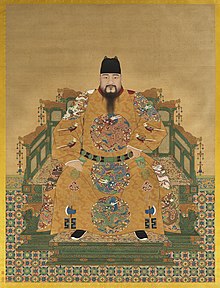
Back چنقهوا AZB Chenghua Catalan Sìng-huá Huòng-dá̤ CDO Čcheng-chua Czech Chenghua (Ming-Kaiser) German Chenghua Spanish چنگهوا Persian Chenghua Finnish Ming Xianzong French Kaisar Chenghua ID
| Chenghua Emperor 成化帝 | |||||||||||||||||
|---|---|---|---|---|---|---|---|---|---|---|---|---|---|---|---|---|---|
 | |||||||||||||||||
| Emperor of the Ming dynasty | |||||||||||||||||
| Reign | 28 February 1464 – 9 September 1487 | ||||||||||||||||
| Enthronement | 28 February 1464 | ||||||||||||||||
| Predecessor | Emperor Yingzong (Tianshun Emperor) | ||||||||||||||||
| Successor | Hongzhi Emperor | ||||||||||||||||
| Crown Prince of the Ming dynasty | |||||||||||||||||
| First tenure | 1449–1452 | ||||||||||||||||
| Predecessor | Crown Prince Zhu Qizhen | ||||||||||||||||
| Successor | Zhu Jianji, Crown Prince Huaixian | ||||||||||||||||
| Second tenure | 1457–1464 | ||||||||||||||||
| Predecessor | Zhu Jianji, Crown Prince Huaixian | ||||||||||||||||
| Successor | Zhu Youji, Crown Prince Daogong | ||||||||||||||||
| Prince of Yi | |||||||||||||||||
| Tenure | 1452–1457 | ||||||||||||||||
| Born | Zhu Jianshen (朱見深) 9 December 1447 Zhengtong 12, 2nd day of the 11th month (正統十二年十一月初二日) | ||||||||||||||||
| Died | 9 September 1487 (aged 39) Chenghua 23, 22nd day of the 8th month (成化二十三年八月二十二日) | ||||||||||||||||
| Burial | Maoling Mausoleum, Ming tombs, Beijing, China | ||||||||||||||||
| Consorts | |||||||||||||||||
| Issue Detail | |||||||||||||||||
| |||||||||||||||||
| House | Zhu | ||||||||||||||||
| Dynasty | Ming | ||||||||||||||||
| Father | Emperor Yingzong | ||||||||||||||||
| Mother | Empress Xiaosu | ||||||||||||||||
The Chenghua Emperor (Chinese: 成化帝; pinyin: Chénghuà Dì; 9 December 1447 – 9 September 1487), also known by his temple name as the Emperor Xianzong of Ming (明憲宗), personal name Zhu Jianshen (朱見深), changed to Zhu Jianru (朱見濡) in 1457, was the ninth emperor of the Ming dynasty, who reigned from 1464 to 1487. He succeeded his father, Emperor Yingzong. "Chenghua", the era name of his reign, means "accomplished change".
Zhu Jianshen was born in 1447 as the son of Emperor Yingzong. However, when he was only two years old, his father was captured by the Mongols during the Battle of Tumu Fortress. As a result, Yingzong was deposed and his younger brother, the new Jingtai Emperor, took over the throne. Yingzong was eventually released from captivity, but was forced into seclusion and house arrest. During this time, Zhu Jianshen was named crown prince, but he was removed from this position after only three years. It wasn't until 1457, when the Jingtai Emperor was overthrown and died, that Yingzong was able to return to the throne. At this point, Zhu Jianshen, now known as Zhu Jianru, was once again named crown prince.
He ascended to the throne in February 1464 at the young age of sixteen, succeeding his father. During the initial years of his reign, he implemented a new policy that included tax cuts and a focus on strengthening the state's power. However, as time passed, the positive impact of these changes diminished. In the later years of his rule, the Forbidden City was dominated by eunuchs, particularly the notorious Wang Zhi and Liang Fang. The emperor's preference for favorites over promoting capable individuals gradually eroded the positive aspects of his rule. This resulted in widespread corruption and the enrichment of his supporters at the expense of the state treasury. Peasant uprisings erupted throughout the country and were brutally suppressed. The emperor ruled with increasing autocracy, bolstering the secret police to monitor the sentiments of the people.
Wan Zhen'er, a palace lady who was 17 years older than the Chenghua Emperor, held significant sway over the emperor and eventually became his favorite. This was especially true after she gave birth to a son in 1464, although the child died shortly after. Despite this, Lady Wan maintained her hold over the emperor and his harem. She used her loyal eunuchs to force other women to have abortions if they became pregnant with the emperor's child, and she did not hesitate to resort to poisoning mothers and their children.[1] It wasn't until 1475 that the emperor discovered the existence of his five-year-old son, Zhu Youcheng, who had been kept hidden until then.
The Chenghua Emperor was known for his military prowess and placed great emphasis on the strength of his army. During the 1470s, the reorganized Ming troops achieved notable triumphs in their battles against the Mongols, marking the first major victories since 1449. In addition, defensive walls were constructed in Shaanxi and Shanxi, laying the groundwork for the enduring Great Wall of China. The Ming also formed an alliance with Korea and effectively waged war against the Jurchen tribes in eastern Manchuria.
The Chenghua Emperor died in 1487 after 23 years of rule, and Zhu Youcheng ascended the throne as the Hongzhi Emperor.
- ^ Mote (2003), p. 630.